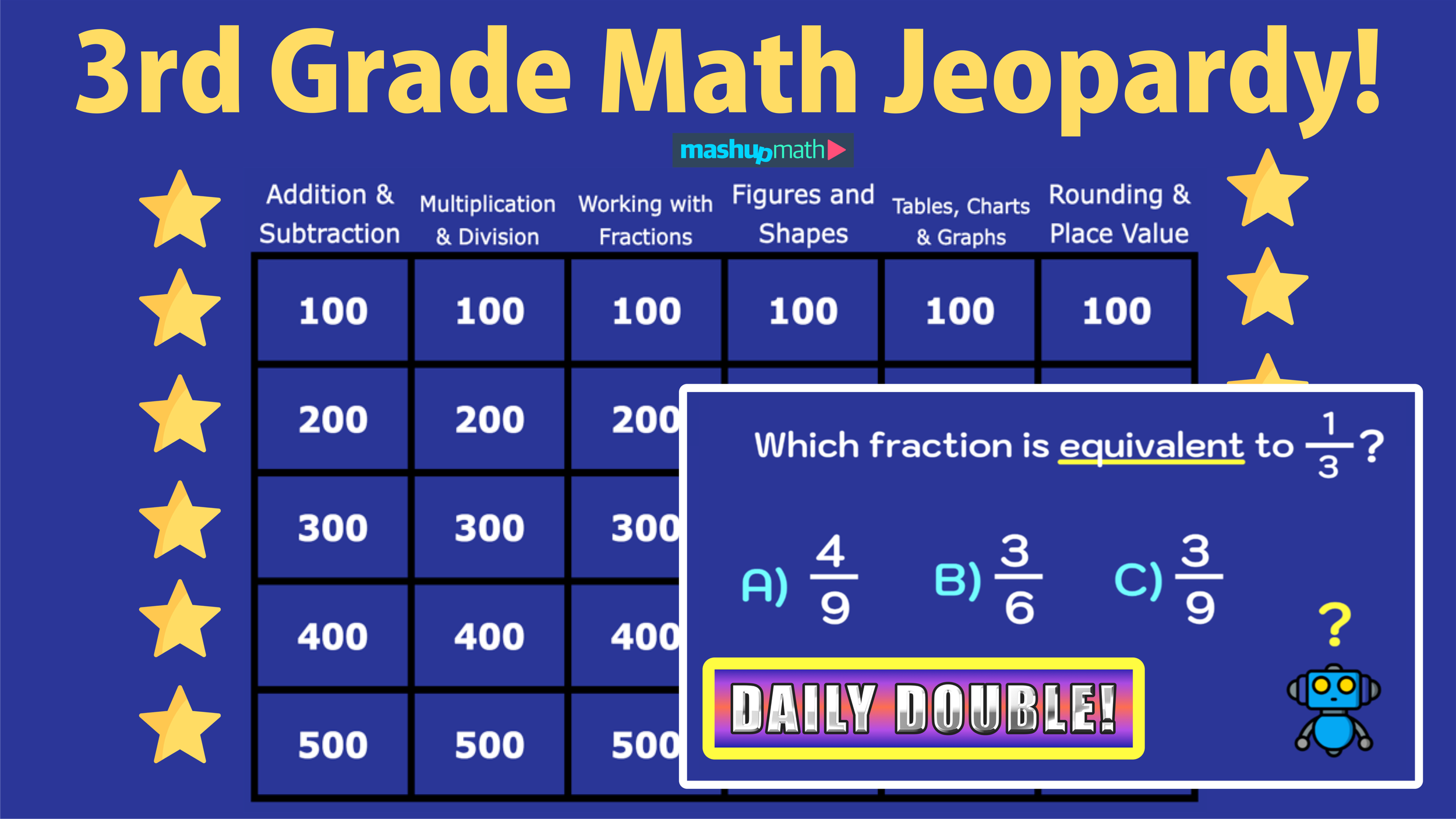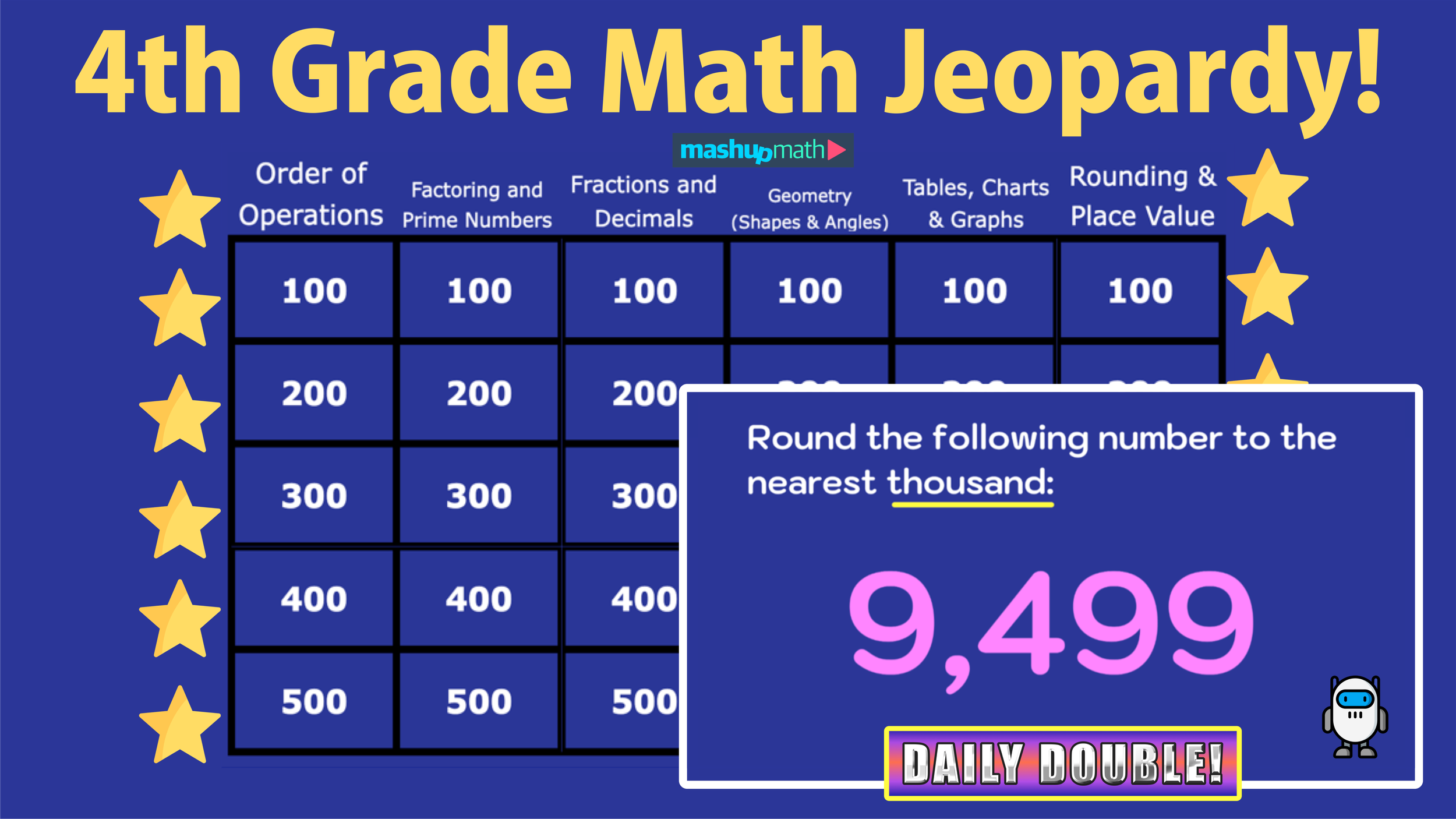6th Grade Math Jeopardy!
How to Play 6th Grade Math Jeopardy: Select and answer questions based on difficulty to earn the most points.
Do you want more super fun (and 100% free) 6th grade math resources?
When you sign-up for our mailing list, you will start receiving FREE 6th grade math worksheets, puzzles, and activities in your inbox every week—and you’ll receive two free math worksheets (pdf downloads).
6th Grade Math Jeopardy: Final Jeopardy Question (Optional)
If you choose to complete the game with a round of Final Jeopardy, have players/teams wager points after seeing the question category, but before revealing the question. You can use the video below to facilitate the Final Jeopardy round.
Math Jeopardy 6th Grade Review: How to Play
If you are looking for an enjoyable and engaging math activity to help your 6th grade students practice and review several key math topics, then it’s time to play 6th Grade Math Jeopardy in your classroom! This 6th Grade Math Jeopardy Review is a fun and engaging math game that gives 6th grade students an opportunity to practice and apply previously learned math skills, procedures, and vocabulary in a game show setting where they can earn points for correctly solving problems and engage in a friendly competition with their classmates. If you are new to Jeopardy-style review games, the following guide will share everything you need to know about getting started and how to use our free Jeopardy Math 6th Grade Review with your sixth graders (don’t worry, it’s extremely easy to do). Keep reading for an explanation of how to play the game and for some tips for students to get the most out of the game (and how to score the most points!).
What is the Math Jeopardy 6th Grade Review?
Sixth Grade Math Jeopardy is an awesome way to review several 6th grade math topics in a context that closely resembles the popular television game show, Jeopardy, where players must compete against each other to correctly answer as many trivia questions as possible and to earn the most points before the game ends. In the television version of Jeopardy, questions are organized by category and difficulty. The trivia categories in the game can range from geography, to classic literature, to pop culture, and everything in-between (which is why contestants who succeed on Jeopardy have such a wide ranging knowledge of trivia).
However, for our 6th Grade Math Review Jeopardy Game, the categories are only based on math topics that are typically covered in 6th grade math classes, including fractions, decimals, scientific notation, geometry, and more!
Other than the categories being limited to sixth grade math topics, 6th Grade Math Jeopardy is extremely similar to the television game show. In both versions, contestants can earn points every time they correctly answer a question. The amount of points each question is worth is based on its level of difficulty—the higher the point value, the more difficult the question. Each category has five questions with the following point values based on difficulty: 100pts, 200 pts, 300pts, 400pts, and 500pts. For example, 100pt question is considered easy, a 300pt-question is considered moderately challenging, and a 500pt question is considered very challenging.
When the Math Jeopardy 6th Grade Review is over, the team or individual player with the highest point total is named the winner.
6th Grade Math Review Jeopardy Game: Game categories are based on math topics that are typically covered in 6th grade math classes, including fractions, decimals, scientific notation, geometry, and more! (Image: Mashup Math FP)
Math Jeopardy 6th Grade Review: How the Game is Played (and How to Do Your Best!)
You can begin playing 6th Grade Jeopardy Math right away by using the free Sixth Grade Math Jeopardy game board at the very top of this page. Our free 6th Grade Math Jeopardy game includes six categories based on 6th grade math topics and each set of questions range from easy (100-200pts), to moderate (300-400pts), to challenging (500pts).
You have several options when it comes to playing the Jeopardy 6th Grade Math game in your classroom. The most common way to play is to split your class into groups/teams of students that will compete against each other. To make the game more fun, you can allow students to select a team name (or you can simply name them Team #1, Team #2, etc.). This approach is best when you have a large group of students. Another way to play is to have students compete in pairs or individually. This approach is best when you have a small group of students (about 12 students or fewer).
Enforce a Time Limit. Just like the television game show, players only have a fixed amount of time to submit an answer to any given question. In the game show, contestants only get 5 seconds to submit their answer before the buzzer sounds, meaning that time has run out and zero points have been awarded. For 6th Grade Math Jeopardy, 5 seconds is not enough time because students will have to read the question, make calculations (mentally or on paper), converse with their teammates, and then submit an answer. So, we recommend giving your students a minimum of 20 seconds to submit an answer. Of course, the amount of time that you allow is at your discretion and should be based on the unique needs and abilities of your students. To help you with enforcing a time limit, you can use the timer below the game board that plays “thinking music” for 20 seconds before a buzzer sounds. Some teachers opt to press play on the timer right after the question has been read (giving students exactly 20 seconds to submit an answer), while others prefer to wait a given amount of time before starting the timer. Again, the amount of time that you allow is at your discretion. Once the buzzer goes off, students can no longer submit an answer and, as a result, they lose their turn and zero points are awarded.
When a team or player’s turn to play has come, a category and point value must be chosen. They can choose to play conservative and choose easier questions with lower point values, or they can play more aggressively and choose more difficult questions in an attempt to earn more points. After the question and point value has been selected, the host will click on the box to reveal and read the question out loud. If a correct answer is given before time has run out, the team or player will earn the corresponding amount of points (which will be added to their score) and that question will turn blank and will not be available to revisit for the duration of the game. On the other hand, if the question is not answered correctly (or if time runs out), you can choose to deduct that point value from their score (you may choose to set zero as the lowest point total for a team to avoid negative numbers) or just award zero points for an incorrect response. When a question is not answered correctly or when time runs out, the next student or team gets an opportunity to solve the problem and earn the points instead.
Daily Doubles! The 6th Grade Math Review Jeopardy Game includes one hidden Daily Double question that is worth double points! Finding this question is a matter of luck, and, when it is chosen, the question graphic will include a Daily Double image, meaning that the question, if answered correctly, is worth 2x the normal point value. For example, a 400-point question that has the Daily Double image is now worth 800 total points! If a team is ever discouraged about being far behind and the Daily Double question has yet to be revealed, remind them that they still have a great opportunity to score a large amount of points in one shot!
Keeping Score. Either the game host (typically a teacher) or a student helper must keep score for each player/team throughout the game. Scores should be posted somewhere that is visible to all contestants (such as on a dry-erase board) so that players can make strategic decisions about what level of questions they should select throughout the game.
How to Win the Math Jeopardy 6th Grade Review Game: The game is over when all questions have been attempted and every box on the game board is blank (or when a predetermined time limit has ended). At this point, the player or team with the highest point total is the winner.
Final Jeopardy (Optional). Concluding the game with Final Jeopardy is optional. To include a Final Jeopardy round, your students will have the opportunity to risk some of or all of their points in an attempt to correctly answer one last question. The category of the question will be revealed before students choose how many points they want to risk. Next, the question will be revealed (see the video above). If students answer the Final Jeopardy question correctly, they will earn the amount of points that were wagered. If not, that amount of points is deducted from their point total.
6th Grade Math Jeopardy: The 6th Grade Math Review Jeopardy Game includes one hidden Daily Double question that is worth double points!
Math Jeopardy 6th Grade Review Tips for Success
Practice, Practice, Practice: You can improve your chances of being successful at 6th Grade Math Jeopardy by staying on top of your math skills, periodically reviewing past lessons and notes, working on practice problems, studying key vocabulary terms, and reviewing as often as possible.
Teamwork is Key: Playing 6th Grade Math Jeopardy with teams is one of the most fun ways to compete, as it gives you a chance to work collaboratively. When playing as a team, it is important to work together, listen to each other, be respectful and supportive, and learn from each other whenever possible.
Be a Good Sport: The whole point of playing 6th Grade Math Jeopardy is to have fun while reviewing math. Yes, the game is meant to be a friendly competition and it’s okay to try your best to score the most points, but that does not mean that players should ever be rude or disrespectful to classmates, the game host, or the scorekeeper.
It’s About Having Fun! The main goal of playing the 6th Grade Math Jeopardy Review Game is to have fun! Remember to enjoy yourself, make a strong effort, approach the game with a positive attitude, and view your mistakes as learning opportunities.
More Fun Math Jeopardy Games:
Search Tags: math jeopardy 6th grade, 6th grade math jeopardy, 6th grade jeopardy math, jeopardy 6th grade math, jeopardy math 6th grade, 6th grade math review jeopardy, 6th grade math staar jeopardy, 6th grade math staar review jeopardy, jeopardy 6th grade math staar review, jeopardy math game 6th grade, 6th grade math jeopardy powerpoint, 6th grade math games jeopardy





















